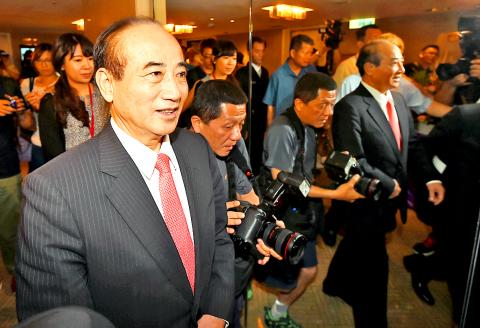A number of Chinese Nationalist Party (KMT) legislators from central and southern Taiwan yesterday expressed concern about support for Deputy Legislative Speaker Hung Hsiu-chu (洪秀柱) in January’s presidential election, despite the 46.203 percent support rate she drew in the party’s presidential primary polls.
KMT party headquarters yesterday announced that Hung passed the required 30 percent support threshold for the primary polls, qualifying her to be nominated for the January election.
KMT sources said that “hesitation and cowardice” among so-called “heavyweights” who failed to run in the primary drove party members to support Hung and help her pass the primary threshold.

Photo: Chang Chia-ming, Taipei Times
KMT Legislator Chen Ken-te (陳根德), a supporter of Legislative Yuan Speaker Wang Jin-pyng (王金平), said there was no question of Hung receiving enough support to pass the party’s internal requirements, adding that now it is up to the party’s Central Standing Committee — and how many of its members would actually respect the party’s system.
Asked if nominating Hung as its presidential candidate would affect the party’s chances of winning, Chen said he was not optimistic about the party’s chances with her as its candidate, adding that the present political environment is against the party.
Whether the party’s upper echelons and its chairman had sufficient wisdom to help the party through the difficult period was key, Chen said, adding that KMT legislators can only help by securing votes in their respective constituencies.
KMT Legislator Huang Chao-shun (黃昭順), who represents a constituency in Kaohsiung, said she was not concerned about the primaries and would respect the party’s decision.
“Nothing has gone according to predictions since the primaries began and nothing seems to be set in stone,” Huang said, adding that she wished only the best for Hung in her efforts.
However, a KMT source in central Taiwan who wished to remain anonymous said that if Hung were nominated, the January presidential and legislative elections in central and southern Taiwan would be a disaster, citing Hung’s dedication to the pan-blue ideology and to unification with China on cross-strait policies as her weak points.
Since the KMT landslide defeat in the nine-in-one elections in November last year, the Democratic Progressive Party (DPP) has gained a lot of influence nationwide and the KMT could ill afford to lose more neutral voters to the pan-green camp, the source said.
Pundits often attributed the KMT’s losses to the President Ma Ying-jeou (馬英九) administration’s China policies.
“We are helpless in the current situation and can only hope for the best,” the source said.
Wang said he congratulated Hung on her primary win.
Asked about his presidential aspirations, Wang said there was no need to speak of past comments, adding that he hoped Hung achieves her goals.
Wang last week said that he would be “duty-bound to agree” to run for president if the KMT were to “draft” him as its candidate.

ANOTHER EMERGES: The CWA yesterday said this year’s fourth storm of the typhoon season had formed in the South China Sea, but was not expected to affect Taiwan Tropical Storm Gaemi has intensified slightly as it heads toward Taiwan, where it is expected to affect the country in the coming days, the Central Weather Administration (CWA) said yesterday. As of 8am yesterday, the 120km-radius storm was 800km southeast of Oluanpi (鵝鑾鼻), Taiwan’s southernmost tip, moving at 9kph northwest, the agency said. A sea warning for Gaemi could be issued tonight at the earliest, it said, adding that the storm is projected to be closest to Taiwan on Wednesday or Thursday. Gaemi’s potential effect on Taiwan remains unclear, as that would depend on its direction, radius and intensity, forecasters said. Former Weather Forecast

As COVID-19 cases in Japan have been increasing for 10 consecutive weeks, people should get vaccinated before visiting the nation, the Centers for Disease Control (CDC) said. The centers reported 773 hospitalizations and 124 deaths related to COVID-19 in Taiwan last week. CDC Epidemic Intelligence Center Director Guo Hung-wei (郭宏偉) on Tuesday said the number of weekly COVID-19 cases reported in Japan has been increasing since mid-May and surpassed 55,000 cases from July 8 to July 14. The average number of COVID-19 patients at Japan’s healthcare facilities that week was also 1.39 times that of the week before and KP.3 is the dominant

The Chinese Communist Party’s (CCP) working group for Taiwan-related policies is likely to be upgraded to a committee-level body, a report commissioned by the Mainland Affairs Council (MAC) said. As Chinese President Xi Jinping (習近平) is increasingly likely to upgrade the CCP’s Central Leading Group for Taiwan Affairs, Taiwanese authorities should prepare by researching Xi and the CCP, the report said. At the third plenary session of the 20th Central Committee of the CCP, which ended on Thursday last week, the party set a target of 2029 for the completion of some tasks, meaning that Xi is likely preparing to

US-CHINA TRADE DISPUTE: Despite Beijing’s offer of preferential treatment, the lure of China has dimmed as Taiwanese and international investors move out Japan and the US have become the favored destinations for Taiwanese graduates as China’s attraction has waned over the years, the Ministry of Labor said. According to the ministry’s latest income and employment advisory published this month, 3,215 Taiwanese university graduates from the class of 2020 went to Japan, surpassing for the first time the 2,881 graduates who went to China. A total of 2,300 graduates from the class of 2021 went to the US, compared with the 2,262 who went to China, the document showed. The trend continued for the class of 2023, of whom 1,460 went to Japan, 1,334 went to